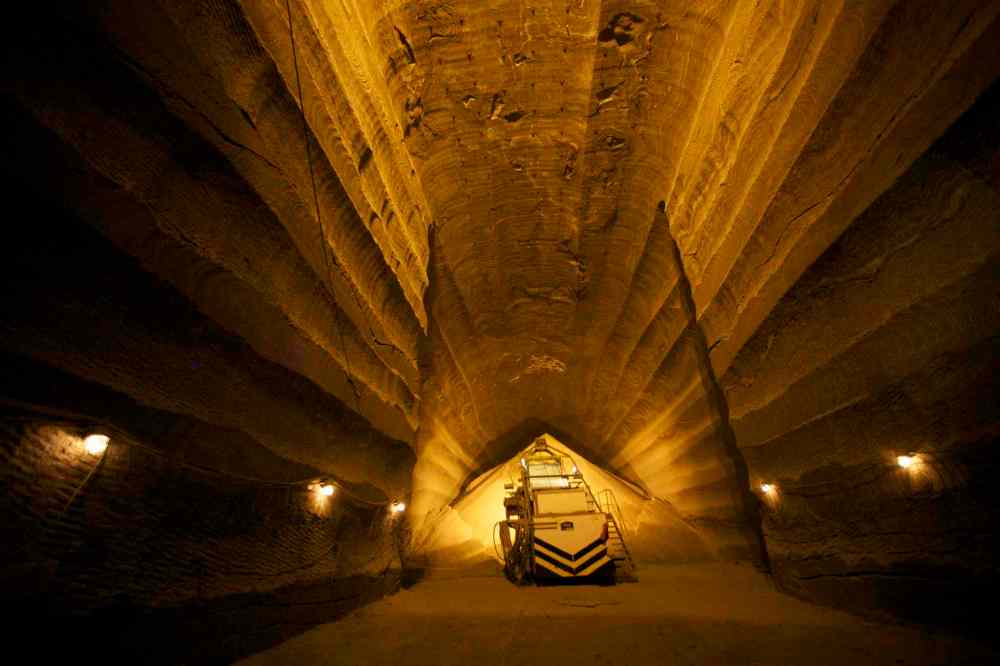Bid to start potash mine begins
Province woos offers from firms, but analysts predict few takers
Advertisement
Read this article for free:
or
Already have an account? Log in here »
To continue reading, please subscribe:
Monthly Digital Subscription
$19 $0 for the first 4 weeks*
- Enjoy unlimited reading on winnipegfreepress.com
- Read the E-Edition, our digital replica newspaper
- Access News Break, our award-winning app
- Play interactive puzzles
*No charge for 4 weeks then billed as $19 every four weeks (new subscribers and qualified returning subscribers only). Cancel anytime.
Read unlimited articles for free today:
or
Already have an account? Log in here »
Hey there, time traveller!
This article was published 13/02/2015 (3359 days ago), so information in it may no longer be current.
An initiative to kick-start what could be a multibillion-dollar potash mine development in western Manitoba has begun.
The province, through a Crown corporation called Manitoba Potash Corp., recently sent a detailed information package to a number of targeted companies to gauge their interest in developing 28,024 hectares “of undeveloped, mineable high-grade potash deposits” north of Russell adjacent to the border with Saskatchewan.
While there are some who believe the potash reserves in Manitoba are large enough to warrant production of a large-scale mine — which would mean the infusion of about $5 billion in capital investment into the province — industry experts are not very optimistic there will be any takers.

Officials from the province’s mineral resources branch were reluctant to say too much.
“We’ve just begun rolling out our marketing process, and we’re waiting for interested companies to complete their preliminary due diligence and respond by March 13, 2015,” a provincial official said. “At this early stage, any comment on the potential outcome of the process and possible financial benefits would be pure speculation and therefore inappropriate.”
It’s an effort to revive a number of false starts by various junior mining companies — as well as major mining concerns — that have been poking around the eastern edges of the Saskatchewan potash basin just across the Manitoba border for decades.
(About 10 years ago, one potash-exploration company working a property in Manitoba distributed a promotional photo of its drill rigs with mountains of salt tailings in the background. While the drilling was in Manitoba, the actual potash production was in Saskatchewan.)
Since it takes about seven years to build a large potash mine, current market conditions may not be the best way to gauge potential interest in the Manitoba property.
Having said that, industry experts are decidedly pessimistic this call for expressions of interest will inspire much enthusiasm.
“Interest from current players in a project like that is probably pretty remote,” said Joel Jackson, a research analyst with BMO Capital Market specializing in fertilizer companies. “The potash industry is quite oversupplied right now and there is massive amounts of new capacity coming on stream in Western Canada and the world, for that matter.”
The three major producers active in Saskatchewan — Saskatoon-based Potash Corporation of Saskatchewan, Plymouth, Minn.-based the Mosaic Company and Calgary-based Agrium Inc. — are all about to increase production.
Officials from Potash Corp. and Mosaic declined to comment on their relative interest in a Manitoba greenfield project.
Richard Downey, a spokesman for Agrium Inc. said, “Agrium is focused on ramping up its major one-million-tonne expansion project at our existing potash mine at Vanscoy Saskatchewan. We also have additional reserves at another location in Saskatchewan, which could be developed as a greenfield in the future some time. As a result I do not believe Agrium is interested in looking at additional sites.”
In addition to those three, the Australian miner, BHP Billiton Ltd. and the German company K + S AG have major potash mines under construction in Saskatchewan with billions of dollars already spent and several more committed to those Saskatchewan projects.
Spencer Churchill, an analyst with Paradigm Capital in Toronto, agreed with Jackson. “The likelihood is pretty small,” he said of a Manitoba greenfield.
“Potash Corp. has four million tonnes of capacity it can bring on in the next two to three years… Agrium just finished spending billions of dollars increasing capacity 50 per cent from two million to three million tonnes.”
As well, even though prices have come back after two major declines in the last few years, both analysts agree production increases are outstripping increases in global demand.
Jackson said, “Global demand has not breached 60 million tonnes in the last decade, but supply is about to go up by 20 million tonnes to 80 million tonnes.”
If the possibility of the majors wading into a Manitoba project are not great, the alternative of having a junior exploration company develop the property for a few years and hand it off to a major does not seem much brighter.
A Bay Street hedge-fund investor partial to the commodity business has soured on potash juniors, noting a couple of the ones that are active in Saskatchewan — Western Potash Corp. and Karnalyte Resources Inc. — are both trading near 52-week lows.
Although producers may not be beating down the doors to get at the Manitoba property, global markets can change, and potash mines take a long time to get up and running.
So there might be some interest as a future consideration.
martin.cash@freepress.mb.ca

Martin Cash
Reporter
Martin Cash has been writing a column and business news at the Free Press since 1989. Over those years he’s written through a number of business cycles and the rise and fall (and rise) in fortunes of many local businesses.


